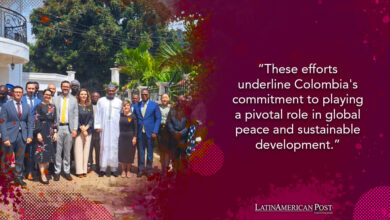Colombia: Economic and Ecological Emergency in La Guajira, One of the Most Forgotten Territories
La Guajira is facing a tough economic outlook and President Gustavo Petro's strategy to rule for a week is no longer possible .

Photo: Petruss
LatinAmerican Post | July Vanesa López Romero
Listen to this article
Leer en español: Colombia: Emergencia económica y ecológica en la Guajira, uno de los territorios más olvidados
In recent days, the president of Colombia , Gustavo Petro, had declared an economic and ecological emergency in La Guajira and announced that his cabinet would take over the department for a week, starting on Monday, June 26. This, which is possible before the Constitution, also gives it the ability to issue decrees with the force of law without requiring the approval of the Congress of the Republic. This is part of the "Government with the People" strategy, which consists of making a presence in departments with structural problems.
In La Guajira, 3 problems have been presented in greater depth: access to water, severe child malnutrition and the impossibility of reaching agreements between the Wayú community and energy companies for wind projects. Although the first two have become visible nationally and internationally since 2017, it is time that there are no real solutions that guarantee a dignified life for the population. This brings to light the little and almost non-existent presence of the State in this region, which is the main cause of the slowness to cover and solve the problems. In addition, historically, the regions with these structural problems, and which tend to be the most vulnerable, are seen or taken into account for extractivist and commercial purposes.
Also read: Gustavo Petro and Nayib Bukele, an Ideological Fight
Although this visit is of great importance and highlights the need to pay attention to the root of the issue, the strategy does not really attack it and could even bring more distance between the government and the region.
As we already mentioned, both the limitations of access to water and child malnutrition are two difficulties in La Guajira that have been highly visible in recent years. For this reason, they must be the first to be solved. However, in his agenda, the reasons for these consequences are not immediately or directly attacked. The only meeting that would be held around the water concern would be the one scheduled for Friday, June 30, in which, together with the Ministry of the Environment, emergency measures will be decreed against the use of water, taking into account that this would be accentuated with the El Niño phenomenon. The fact that the measures are going to be about the “use” and not about the democratization of drinking water for the entire population, may imply that, once again, this situation is overlooked.
Likewise, the government is expected to deliver facilities and projects focused on attacking malnutrition. On July 1, the decree of the Truth Commission/Scientific Commission was signed, whose purpose is to investigate and make visible the reasons for deaths due to malnutrition in children in the region. In addition, on July 1st, the pediatric wing for nutritional risk will be delivered in Maicao. These measures are valuable, but they do not take into account one of the main reasons for the problem: the precariousness of Guajira families and the lack of possibilities to feed both adults and children. Also, the health system is not giving results, so it is not very useful to open a pediatric wing specialized in these cases, if families cannot access it.
Finally, if an agreement is reached between the Wayú communities and the energy companies, the wind projects will advance, which could increase the tension that has already been developing for months. Although these projects are labeled renewable energy, it should not be forgotten that carrying them out in the region is the cause of a geographic strategy to locate wind and solar power plants in the north of the country. In this sense, extractivist thought would continue to stand, which would not put the population and the State on the same level. That is why the Wayú communities have shown so much opposition to the agreements.
In conclusion, the government is facing structural problems that require much more than a week and resources to attack the root of the problem to really bring about change in this region, which has been hit hard by the absence of the State.




